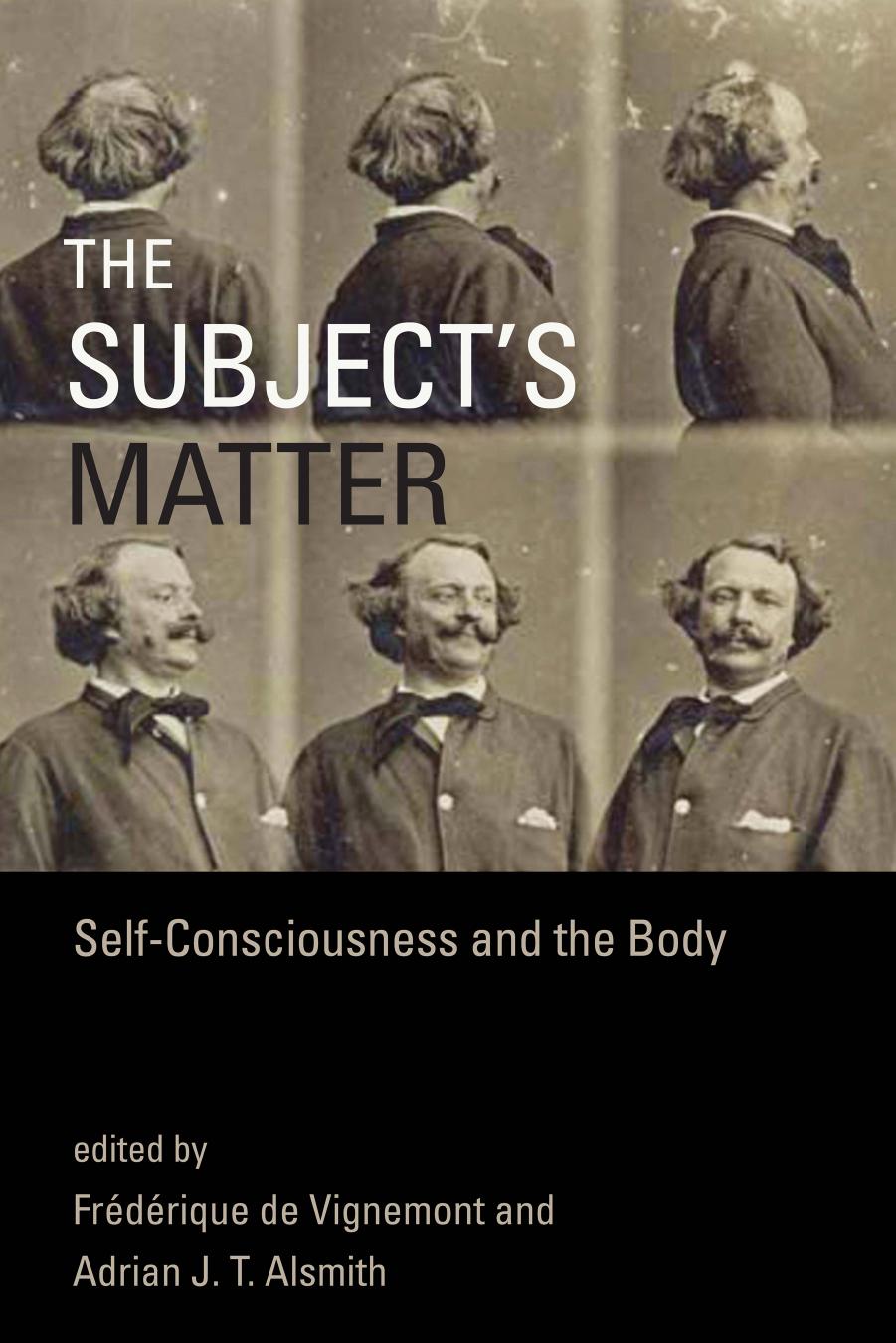The Subject's Matter: Self-Consciousness and the Body by Adrian J. T. Alsmith

Author:Adrian J. T. Alsmith [Alsmith, Adrian J. T.]
Language: eng
Format: epub, pdf
Tags: Mind & Body, psychology, agency; body representation; schema; proprioception; self; touch; awareness; bodily; ownership; perception; perceptual; sensation; sense; sense of self; space; spatial; philosophy of mind; cognitive science; mind and body; cognition, Cognitive Psychology & Cognition, Philosophy
ISBN: 9780262036832
Google: FOhCDwAAQBAJ
Publisher: MIT Press
Published: 2017-12-15T00:33:11.753013+00:00
2â â â â Depersonalization
We have seen that de Vignemont argues against the deflationary view by appeal to the case of somatoparaphrenia. âDepersonalizationâ is another pathological condition that consists in a deep modification of the way things appear to a subject, leading him to feel estranged from his body, his actions, his thoughts, his mind, and even from himself. Although there are subclinical forms of depersonalization or proto-depersonalization characterized by mild or short-lived feelings, depersonalization can be intense, pervasive, and debilitating, leading the subject to seek medical help. Unlike patients suffering from somatoparaphrenia, depersonalized patients are not however generally delusional: their reality testing is intact and they take great care not to take their strange impressions at face value.
In what follows, I will focus on such cases of severe (but nondelusional) depersonalization and argue that they constitute a fruitful probe for current theories of the sense of bodily ownership.3
Depersonalized patients typically report feeling estranged from their body. This alienation usually involves the impression of not owning some of oneâs bodily parts. The third item of the Cambridge Depersonalization Scale (a questionnaire that has become the gold standard for assessing depersonalization) thus reads âParts of my body feel as if they didnât belong to me.â4
Patients can in fact complain of feeling their whole body as alien:
I do not feel I have a body. When I look down I see my legs and body but it feels as if it was not there. When I move I see the movements as I move, but I am not there with the movements. I am walking up the stairs, I see my legs and hear footsteps and feel the muscles but it feels as if I have no body; I am not there. (Dugas & Moutier, 1911, p. 28, my translation)
When they feel like not owning their whole body patients can also report feeling outside of their body or seeing themselves from outside:
I feel like a robot, like I am listening to someone else talking, like I am looking at myself from the outside, but it is not another voice or body, it is mine, it is me, it just doesnât feel like it.⦠I spend all day trying to figure it out. Maybe I am too analytical. Nothing makes it better but being with other people makes it worse. (Baker et al., 2003, p. 431)
Depersonalized patients do not, however, just suffer from an altered sense of bodily ownershipâawareness of their bodily parts as theirsâthey seem to have an impaired awareness of their bodily sensations too. Many spontaneously describe themselves as not feeling any bodily sensations in certain parts of their body (âthe top of my head is popping and buzzing and then it seems to go all numb,â Shorvon, 1946, p. 42) or even in their whole body (âhe claims he has lost all sensibility,â Janet, 1908, my translation) and they can touch or hurt themselves in order to feel something. A patient of Leroyâs thus kept touching and pinching every part of her body:
She did not feel anything, or rather, she did not feel anything as she used to, so she had to touch herself.
Download
The Subject's Matter: Self-Consciousness and the Body by Adrian J. T. Alsmith.pdf
This site does not store any files on its server. We only index and link to content provided by other sites. Please contact the content providers to delete copyright contents if any and email us, we'll remove relevant links or contents immediately.
The Art of Coaching by Elena Aguilar(49989)
Thinking, Fast and Slow by Kahneman Daniel(10561)
The Art of Thinking Clearly by Rolf Dobelli(8836)
The 5 Love Languages: The Secret to Love That Lasts by Gary Chapman(8481)
Mindhunter: Inside the FBI's Elite Serial Crime Unit by John E. Douglas & Mark Olshaker(7831)
Therapeutic Modalities for Musculoskeletal Injuries, 4E by Craig R. Denegar & Ethan Saliba & Susan Saliba(7346)
Periodization Training for Sports by Tudor Bompa(7324)
When Breath Becomes Air by Paul Kalanithi(7256)
Bodyweight Strength Training by Jay Cardiello(7180)
Becoming Supernatural by Dr. Joe Dispenza(7100)
Turbulence by E. J. Noyes(7033)
Nudge - Improving Decisions about Health, Wealth, and Happiness by Thaler Sunstein(6629)
The Road Less Traveled by M. Scott Peck(6627)
Enlightenment Now: The Case for Reason, Science, Humanism, and Progress by Steven Pinker(6404)
Win Bigly by Scott Adams(6306)
Mastermind: How to Think Like Sherlock Holmes by Maria Konnikova(6227)
Kaplan MCAT General Chemistry Review by Kaplan(6045)
The Way of Zen by Alan W. Watts(5790)
Why We Sleep: Unlocking the Power of Sleep and Dreams by Matthew Walker(5637)
